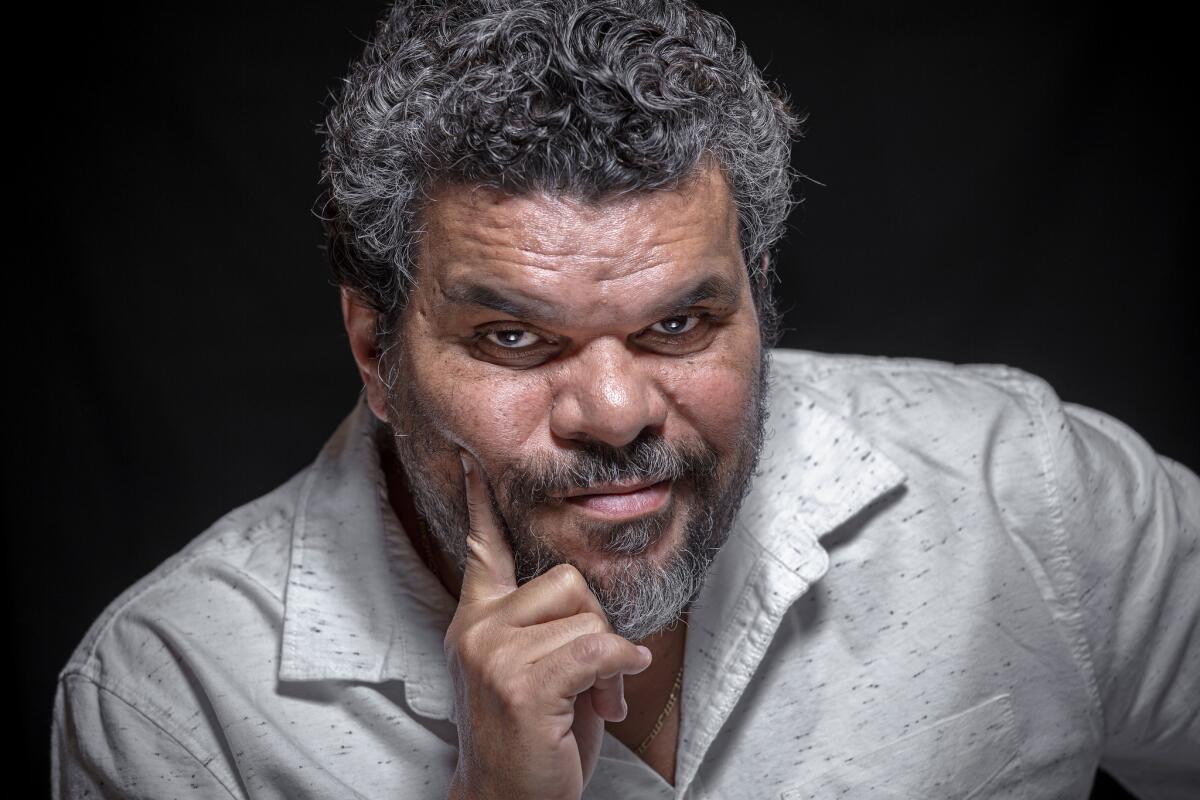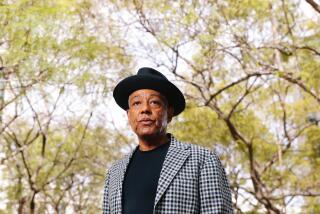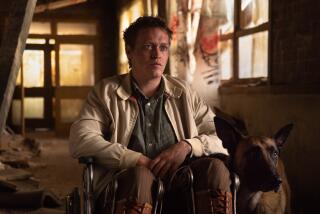Q&A: ‘Bad guy’ Luis Guzmán has fun being evil in ‘Ana Maria in Novela Land’

He’s “that guy” — the chest-baring club owner in Paul Thomas Anderson’s “Boogie Nights,” the undercover DEA agent in Steven Soderbergh’s “Traffic,” the recovering thug in Peter Segal’s “Anger Management.” Luis Guzmán, who has appeared in more than 70 films, is adding another heavy to his reservoir of law enforcement agents and bad guys. He plays nefarious attorney Licenciado Schmidt in Georgina Garcia Riedel’s new comedy “Ana Maria in Novela Land,” about a young woman who magically switches places with the heroine of her favorite Mexican telenovela.
You started off as a social worker, and you did activist street theater for years. Did it feel awkward playing bad guys like Goon #1 and Gang Member #2 early on in your career?
Not really. I paid my dues, learned the business, and just like in anything, you evolve. You go from playing bad guys, then you play a cop, then someone who even though he might be dangerous, he’s sympathetic. In the beginning I kinda had to swallow it — it was work. When you build a career, you’re building a foundation. Also, being a social worker, the first five, six years of my career I took acting roles but still kept my 9-to-5 working with teenagers. I looked at the acting as a way to be a role model for them.
Did you ever feel frustrated or typecast?
Honestly, I never really got frustrated. If I’m gonna be a bad guy, I’m gonna be a [fierce] bad guy. People are gonna remember it. That sort of became my stamp. The roles were what they were, but I made them memorable. I look at myself as an artist. You give me a blank canvas and I’ll put something on there for you. Every project I do, every role, it’s a different approach.
Appearing in more than 70 movies, you bring a lot of perspective. How have you seen the entertainment industry change for Latinos?
I don’t look at it anymore as an industry giving Latinos opportunity; that was back in the day. People had to stand up and say, “We [can play more than] drug dealers, prostitutes and rapists.” Now we have Latino directors, producers, writers, VPs, actors, people creating music scores. We belong. We just happen to be a part of the universe too, like everybody else. But I do have a problem when I watch all these award shows and there is a true lack of representation — the Oscars, the Golden Globes. It’s a big turnoff.
“Ana Maria in Novela Land” follows the CW’s “Jane the Virgin” and precedes Eva Longoria’s NBC comedy, “Telenovela.” Why do you think telenovelas are suddenly so hot in Hollywood?
Telenovelas have been a staple in Latin households, just like soap operas are staples in American households. I think there’s a calling for this stuff now. It’s really popular — I mean, people stop work just to watch a telenovela because it’s so scandalous and gossipy; it really strikes a nerve. It also lends itself to TV and adaptations. Look at the state of entertainment and TV now, everything is adaptations.
Why were you drawn to the project?
I dug the concept of it — a story within a story. It’s really fun. The script was really well written, and it’s very, very funny. Creatively speaking, it was a different kind of role for me, it was a fun role. You’re an actor on a telenovela, which I find hysterical. I play the evil lawyer who’s trying to keep her out of the family fortune, and I don’t want her to marry the son. I just liked it because it was entertaining. It’s really what goes on in that telenovela world.
You co-produced an upcoming documentary, “The NIMBY Experience,” for which you went homeless for three days on the streets of New York City. What was that like?
It was probably the most humbling thing I’ve ever done. I started out with $1.50 in my pocket. I walked 30 miles in three days in the borough of Manhattan. The first night I slept on the ground on concrete. That was not the most comfortable experience. It was pretty hard-core. I went to a food pantry and ate little boxes of cereal. Sometimes we see a homeless person when we’re walking down the street, and we tend to look the other way for fear they’re gonna ask for something; and I experienced that. It was mind-boggling how isolated I felt, how that really deteriorates your psyche. I try to do stuff that’s gonna be helpful to people in the world, especially coming up the way I did on the Lower East Side of New York.
Is that where you draw inspiration for the array of bad guys you’ve played?
Oh, yeah, growing up on the Lower East Side, there were all kinds of bad guys there — and some of them were your friends. I had my run-ins with drug dealers. Some of them ended up in jail, some I still talk to — because people grow out of it and people don’t stay bad forever. But [back then], I was busy being an activist, trying to save the neighborhood. I use my life experience in everything I do.
Why do you live in Vermont, so far from your work in Hollywood? And what’s life like there?
I have five kids. My family is very important to me, and I wanted my children to have a real childhood. I think the country lends itself to that. Life is really laid back. You’re not in the limelight. I live on a farm, on about 600 acres of land in the woods. I cut my own wood, and we do maple sugaring for maple syrup out there. We go kayaking in the summertime, do some gardening, horseback riding, barbecues.
What’s coming up next for you?
I’m in Vancouver now, shooting the pilot for a series called “Roadies” with [director] Cameron Crowe and [producer] J.J. Abrams. It’s for Showtime. It’s about the roadies at big venue concerts. I also have two movies, both comedies, coming out this year where I play the lead. “Puerto Ricans in Paris” and “Aztec Warrior.” I love doing comedy.
Twitter: @debvankin
More to Read
Only good movies
Get the Indie Focus newsletter, Mark Olsen's weekly guide to the world of cinema.
You may occasionally receive promotional content from the Los Angeles Times.







